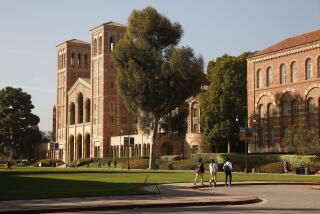IRVINE : UCI Scientists Get Equipment Grant
- Share via
Two world-renowned UC Irvine scientists have been awarded a $675,000 grant to purchase sophisticated laboratory equipment for testing gases that are depleting the Earth’s ozone layer and contributing to global warming, university officials announced Monday.
The equipment, to be purchased with a donation from the W.M. Keck Foundation, will be added to the laboratories of F. Sherwood Rowland, a professor of chemistry, and Ralph Cicerone, chairman of the geosciences department.
“It is a significant amount of money,” UCI spokesman Randall Black said. “And it gives broad-based support to both geosciences and atmospheric chemistry. It’s a significant indicator of the importance of this science.”
The grant is the largest single one awarded UCI by the Keck Foundation, which is a large, nonprofit foundation that awards grants for science, engineering and medicine.
The scientists will use the equipment, including highly sensitive mass spectrometers and an automated gas chromatography system, to measure gases in the atmosphere, including chlorofluorocarbons (CFCs) and methane. The devices are capable of detecting minute amounts of gases in air samples at a rapid pace, replacing older equipment currently used in the laboratories.
Rowland said the new automated system and advanced equipment will allow his UCI team to investigate many more gases and accelerate its analysis of samples. His laboratory processes 3,000 atmospheric samples a year, mostly from remote places around the world.
“Their workload has become tremendously great, so the bottom line is they want to increase the automation of the analysis process,” Black said. “They are starting to bump their heads on the ceiling in the amount of samples they can take.”
In the early ‘70s, Cicerone established the theory that chlorine would destroy the Earth’s protective ozone layer. Rowland, working with another scientist, was the first to link CFCs with a growing hole in the ozone layer 17 years ago.
Rowland and Cicerone remain two of the world’s foremost researchers into global atmospheric change, making UCI one of the top research centers for the science.
Both scientists have argued vigorously for a worldwide ban on CFCs, which are widely used as industrial solvents and refrigerants. Their continued work helped persuade the United States and the world’s top industrialized nations to agree to gradually phase out use of the chemicals by the year 2000.
Rowland’s latest research has shown that CFC concentrations in the atmosphere are increasing, despite the phase-out, because the chemicals take 10 years to reach their full potency and can persist in the atmosphere for 75 to 100 years.






